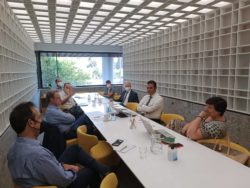Kıvanç Ulusoy is currently a Professor of Political Science at the Istanbul University. He was previously a Fulbright Fellow at the Harvard Kennedy School (2012-2013), a Jean Monnet Fellow at the Robert Schuman Centre for Advanced Studies at the European University Institute in Florence (2003-2004) and a fellow at the Madrid Diplomatic School (1996-1997). His areas of research include regime change and democratization, Turkish politics and Turkey-EU relations. Dr. Ulusoy has conducted studies at the Departments of Political Science and International Relations in various universities such as the Middle East Technical University, Bogazici University and Sabanci University in Turkey; Granada University in Spain; Stockholm University in Sweden; Tsukuba University in Japan; Hebrew University in Jerusalem.
Some of his recent publications are “Turkey’s reform reconsidered, 1987-2004”, Democratization, June 2007; “The Changing Challenge of Europeanization to Politics and Governance in Turkey”, International Political Science Review, Vol. 30, No. 3, (November 2009); “Manipulative Deliberation in Turkey: Alevi’s Defective Political Engagement and Remedying Strategies”, J. Ugarriza and D. Caluwaerts (eds) Democratic Deliberation in Deeply Divided Societies: from Conflict to Common Ground, (New York: Palgrave, 2014); “Elections and Regime Change in Turkey: Tenacious Rise of Political Islam”, M. Hamad and K. al-Anani (eds) Elections and Democratization in the Middle East: The Tenacious Search for Freedom, Justice and Dignity, (New York: Palgrave, 2014); “Special Issue: Geopolitics of Conflict in the Eastern Mediterranean”, The Journal of Balkans and the Near East, (2016), 18 (4); Conflict and Prosperity: Geopolitics and Energy in the Eastern Mediterranean, (together with Andreas Stergiou and Menahem Blondheim), (Jerusalem: Israeli Academic Press, 2017). “Turkey and Israel: Changing Patterns of Alliances in the Eastern Mediterranean”, Journal of Balkan and Near Eastern Studies, (2020), 22 (3): 415-430; “Testing Turkey’s state capacity: The Syrian Migration Crisis as Catalyst”, European Journal of Law and Migration, (2021), 23 (1): 152-175.



